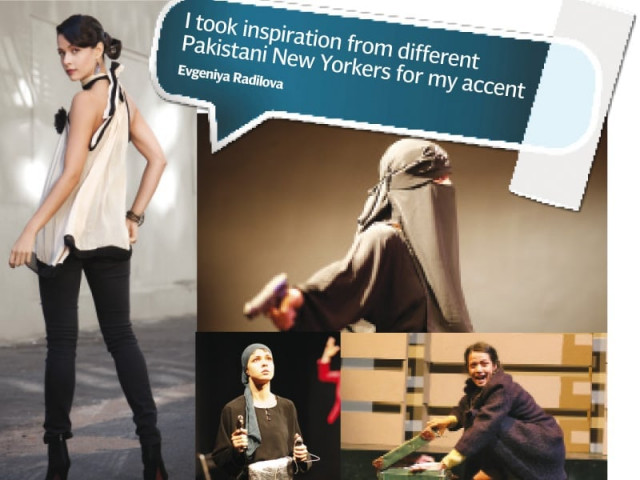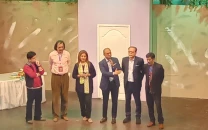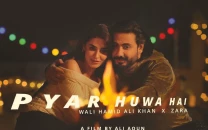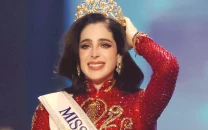TV’s Bond girl from Waziristan
Evgeniya Radilova studied the Pashtun tribal culture for her role.

Evgeniya Radilova takes challenging roles in her stride. After playing a Chechen revolutionary and a Holocaust survivor onstage, she’s now appeared as a militant from Waziristan in NBC’s “Law & Order: Special Victims Unit” (episode 299: ‘Acceptable Loss’).
Viewers first meet her character, Sofia, emerging from a limousine in a form-fitting mini-dress. She has the panache of a Bond girl, though she’s in the improbable guise of a prostitute planning an attack on Manhattan.
Later, when Sofia is interrogated, her accent may sound a little foreign to our ears but her fiery defiance makes it obvious that the role has seeped under Radilova’s skin. Director Alex Chapple called her “a Joan of Arc” because Sofia seems more like a wronged victim than a stereotypical radical terrorist.
While viewers may be horrified by Sofia’s thirst for revenge, they can’t but feel anguished by the restrained passion in her voice as she describes the drone strikes that killed her father while he was tending the wounded in Waziristan. This, in itself, is a coup for the show’s writers. As Radilova puts it, “Sofia is a volcano ready to burst.”
Born in Bulgaria to an actor mother and director father, Radilova was 20 when she arrived in New York with a green card and big dreams. She studied acting and English and launched a politically themed theatre company aptly named Dare to Speak Productions.
Now, at the age of 28, the actor reveals her insightful portrayals of distinctive Muslim characters from strife-ridden regions:
Radilova says: You’ve portrayed riveting characters in Special Victims Unit (SVU) and in the play, “I Plead Guilty.” How would you draw parallels between the two?
Both characters have lived very difficult lives and have had to face almost the same fate. Sofia lives in Waziristan, dealing with the Taliban and the war on terror and has lost her father. Seda lives in Chechnya, trying to stop the Russian troops killing and bombarding her country and has lost her husband. Their freedom of choice had been stripped away. In the conditions they were living in, these women had no other choice but to seek revenge.
How did you research Seda?
I watched secret footage of the Chechen hostage takers and survivors from the 2002 Theatre Siege of Moscow. One of the so-called terrorists told her story about how the Russians killed her entire family. She couldn’t bear living anymore and was ready to give it up in the name of stopping the Chechen war.
Did you base Sofia’s accent and mannerisms on any real-life women?
I took inspiration from different Pakistani New Yorkers for my accent. I also read about women from Waziristan who have spoken about the drone attacks.
Had you ever heard of this region before taking on this part?
I was aware of Waziristan and the war that has been going on for a long time. The most important part of your job as an actor is to research and investigate where your character is coming from and what they’re going through. I watched documentaries and studied Pashtun tribal culture.
What is your opinion on the realism and humanity of Sofia?
It is very difficult for me to even imagine how you would feel when everyone around you has been killed. You wake up everyday with the fear that today might be the day that the drones hit your home. I believe in the realism of Sofia’s past and in her plan for the future.
Has it come as a surprise to be contacted by a Pakistani journalist?
Honestly, I was very surprised and honoured to be contacted. After performing the role of Sofia, I feel like a part of me is Muslim and it feels like I have already been in Pakistan. I hope one day I have the chance to really see it.
So you’re a professional fire
performer too?
Fire is my light! Some people do yoga, others do martial arts, and I dance with fire for relaxation, meditation and excitement. It’s the other me. Poi is a Hawaiian fire dance which I learned on my own in Bulgaria using long chains attached to Kevlar balls and dipped in fuel. I love to dance!
Published in The Express Tribune, November 9th, 2012.
Like Life & Style on Facebook and follow at @ETLifeandStyle for the latest in fashion, gossip, entertainment



















COMMENTS
Comments are moderated and generally will be posted if they are on-topic and not abusive.
For more information, please see our Comments FAQ